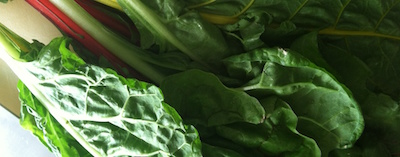Chard
Caution Chard ↑ Oxalates
Beta vulgaris
Swiss chard
Red chard
Rainbow chard
Green chard
Chard is high in oxalates. Raw chard is extremely perishable. Chard belongs to the chenopod family, including beets, chard, spinach, and quinoa (all high in oxalates). If chard gives symptoms of kidney stones or arthritis symptoms try a different leafy green like lettuce or purslane (from a different family of vegetables).
Swiss chard contains bone-healthy calcium; however, they also contain substances called oxalates, which can bind up the calcium and make it unavailable to the body. Swiss chard contains oxalic acid, a naturally-occurring substance found in some vegetables, which may crystallize as oxalate stones in the urinary tract in some people. It is, therefore, advisable to avoid eating chard in people with known oxalate urinary tract stones
Regular inclusion of chard in the diet has been found to prevent osteoporosis, iron-deficiency anemia, and vitamin-A deficiency; and believed to protect from cardiovascular diseases and colon and prostate cancers. High in vitamin K.
Swiss chard is a very good source of calcium and its excellent supply of magnesium and vitamin K, chard provides standout bone support. Swiss chard is one of the most popular vegetables along the Mediterranean and it is one of the most nutritious vegetables around and ranks second only to spinach following an analysis of the total nutrients of the Healthiest vegetables. It is also one of only three vegetables that a quick dip in boiling water is needed to help reduce its concentration of oxalic acid.
From the world's healthiest foods
"To help decrease oxalates, if they bother you:
Use a large pot (3 quart) with lots of water and bring to a rapid boil. Add chard to the boiling water. If stems are more than 1-inch wide,
cook them for 2 minutes before adding the leaves. If less than 1 inch in width you can boil the leaves and stems together for 3 minutes.
Begin timing as soon as you place the chard in the pot if you are using 1 pound or less of chard. If you are cooking large quantities of
chard bring the water back to a boil before beginning timing the 3 minutes. Do not cover the pot when cooking chard. Leaving the pot
uncovered helps to release more of the acids with the rising steam. Toss the water as this contains oxalates."
